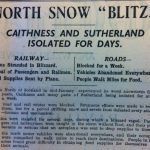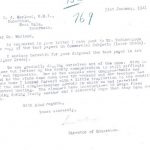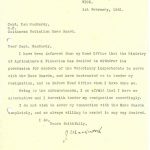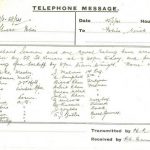Following the fall of Tobruk last week, British and Australian forces now continued east along the Libyan coast, defeating an Italian force and capturing the port of Derna. By the end of January the Italians had decided to pull out of Cyrenaica, the eastern province of Libya. In East Africa the Indian 4th Division captured Agordat in Eritrea and took 1,000 Italian prisoners. Also this week, Germany threatened to torpedo any neutral ship carrying supplies to the Allies.
 Across the North of Scotland the heavy snowstorms continued. The John O’Groat Journal reported a North Snow “Blitz” across Caithness and Sutherland, describing it as the worst snowstorm for 22 years: “All road and rail routes were blocked. Strenuous efforts were made to reopen them, but for a period drifting snow and severe frost defeated every attempt – human and mechanical.” Some rail passengers were stranded and even had to have supplies dropped by plane.
Across the North of Scotland the heavy snowstorms continued. The John O’Groat Journal reported a North Snow “Blitz” across Caithness and Sutherland, describing it as the worst snowstorm for 22 years: “All road and rail routes were blocked. Strenuous efforts were made to reopen them, but for a period drifting snow and severe frost defeated every attempt – human and mechanical.” Some rail passengers were stranded and even had to have supplies dropped by plane.
Mr McHardy, the County Director of Education, wrote on 31 January: “We are gradually digging ourselves out of  the snow. Wick is clear but farther up the county communication is still difficult if not impossible. One or two schools were unapproachable and as the storm came down over the weekend and the teachers had gone home I looked forward with a little trepidation to the condition of the small single-teacher schools in which we had installed central heating. The cleaners have instructions to keep fires going during frosty weather and I sincerely hope that they have done so.”
the snow. Wick is clear but farther up the county communication is still difficult if not impossible. One or two schools were unapproachable and as the storm came down over the weekend and the teachers had gone home I looked forward with a little trepidation to the condition of the small single-teacher schools in which we had installed central heating. The cleaners have instructions to keep fires going during frosty weather and I sincerely hope that they have done so.”
 Now that the immediate prospect of a German invasion was receding, the Government began to increase the numbers of “reserved occupations”. On 1 February J. Mackintosh or Morven House, Wick, wrote to Captain McHardy: “I have been informed from my Head Office that the Ministry of Agriculture & Fisheries has decided to withdraw its permission for members of the Veterinary Inspectorate to serve with the Home Guards, and have instructed me to tender my resignation.”
Now that the immediate prospect of a German invasion was receding, the Government began to increase the numbers of “reserved occupations”. On 1 February J. Mackintosh or Morven House, Wick, wrote to Captain McHardy: “I have been informed from my Head Office that the Ministry of Agriculture & Fisheries has decided to withdraw its permission for members of the Veterinary Inspectorate to serve with the Home Guards, and have instructed me to tender my resignation.”
Finally, by coincidence three mines exploded on the Caithness coast all within a few hours of each other on  Tuesday 28 January. At 1.30 pm the Police took a telephone message from the Coastguard: “Explosion apparently from mine along Shore ½ mile south of Latheronwheel Harbour at 13.00 hrs today”. Then someone added the following note to the same message sheet: “Mine exploded at Broadhaven, Wick, at about 1.45 pm on 28/1/41, but no damage was caused and no person was injured.” Finally, “An explosion, believed to be a mine washed ashore, was heard at 10.15pm and the flash of the explosion was seen at Coastguard Station, Wick, coming from about 1 mile south of Wick.”
Tuesday 28 January. At 1.30 pm the Police took a telephone message from the Coastguard: “Explosion apparently from mine along Shore ½ mile south of Latheronwheel Harbour at 13.00 hrs today”. Then someone added the following note to the same message sheet: “Mine exploded at Broadhaven, Wick, at about 1.45 pm on 28/1/41, but no damage was caused and no person was injured.” Finally, “An explosion, believed to be a mine washed ashore, was heard at 10.15pm and the flash of the explosion was seen at Coastguard Station, Wick, coming from about 1 mile south of Wick.”
